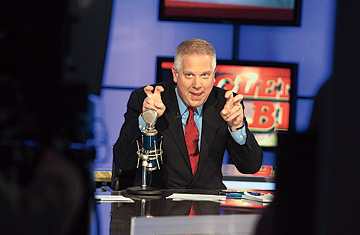
Glenn Beck
(6 of 7)
His website claims 5 million unique visitors per month; his weekly podcast is seen by 1.5 million people each week. Between them, he draws at least $3 million annually online. He has an online magazine, Fusion; a newsletter that touts Beck merchandise; and a tradition of live performances--a blend of stand-up comedy and political monologues--that have drawn more than 200,000 fans in recent years. The finale of his most recent tour was simulcast in some 450 movie theaters across the country.
Lured by the Fox News Channel from CNN's Headline News channel last year, Beck has lit up the 5 p.m. slot in a way never thought possible by industry watchers, drawing upwards of 3 million viewers on some recent days. Indeed, despite his late-afternoon start, he sometimes beats even Bill O'Reilly, Fox's prime-time behemoth, in key ratings demographics. The value of his Fox contract is reliably said to be about $2 million per year.
With a staff of about 25 employees at Mercury and 10 or so at Fox, Beck Inc. is doing its part to jump-start the economy. And there are ancillary industries feeding on the success of Beck and others like him. Both left- and right-wing not-for-profit groups operate as self-anointed media watchdogs, and one of the largest of these--the liberal group Media Matters for America--has a multimillion-dollar budget. Staff members monitor Beck's every public utterance, poised to cherry-pick the most inflammatory sentences. (Conservative outfits do the same for the likes of MSNBC's Keith Olbermann.) These nuggets are used in turn to rev up donations to political parties and drive ratings for the endless rounds of talking-head shows.
The inevitable question is, How much of this industry is sincere? Last year, shortly after the election, Beck spoke with TIME's Kate Pickert, and he didn't sound very scared back then. Of Obama's early personnel decisions, he said, "I think so far he's chosen wisely." Of his feelings about the President: "I am not an Obama fan, but I am a fan of our country ... He is my President, and we must have him succeed. If he fails, we all fail." Of the Democratic Party: "I don't know personally a single Democrat who is a dope-smoking hippie that wants to turn us into Soviet Russia." Of the civic duty to trust: "We've got to pull together, because we are facing dark, dark times. I don't trust a single weasel in Washington. I don't care what party they're from. But unless we trust each other, we're not going to make it."
How can we trust each other, though, when the integrated economy of ranters and their delighted-to-be-outraged critics are such a model of profitability? A microphone, a camera and a polarizing host are all it takes to get the money moving. Because audiences have been so widely fragmented by the new technology, ratings that would have gotten a talk-show host canceled in the late 1980s create a superstar today. (In 1987 comedian David Brenner bombed in syndication with about 2.5 million viewers at midnight--which is roughly what Fox, the leading network for political talk shows, averages in prime time.)
